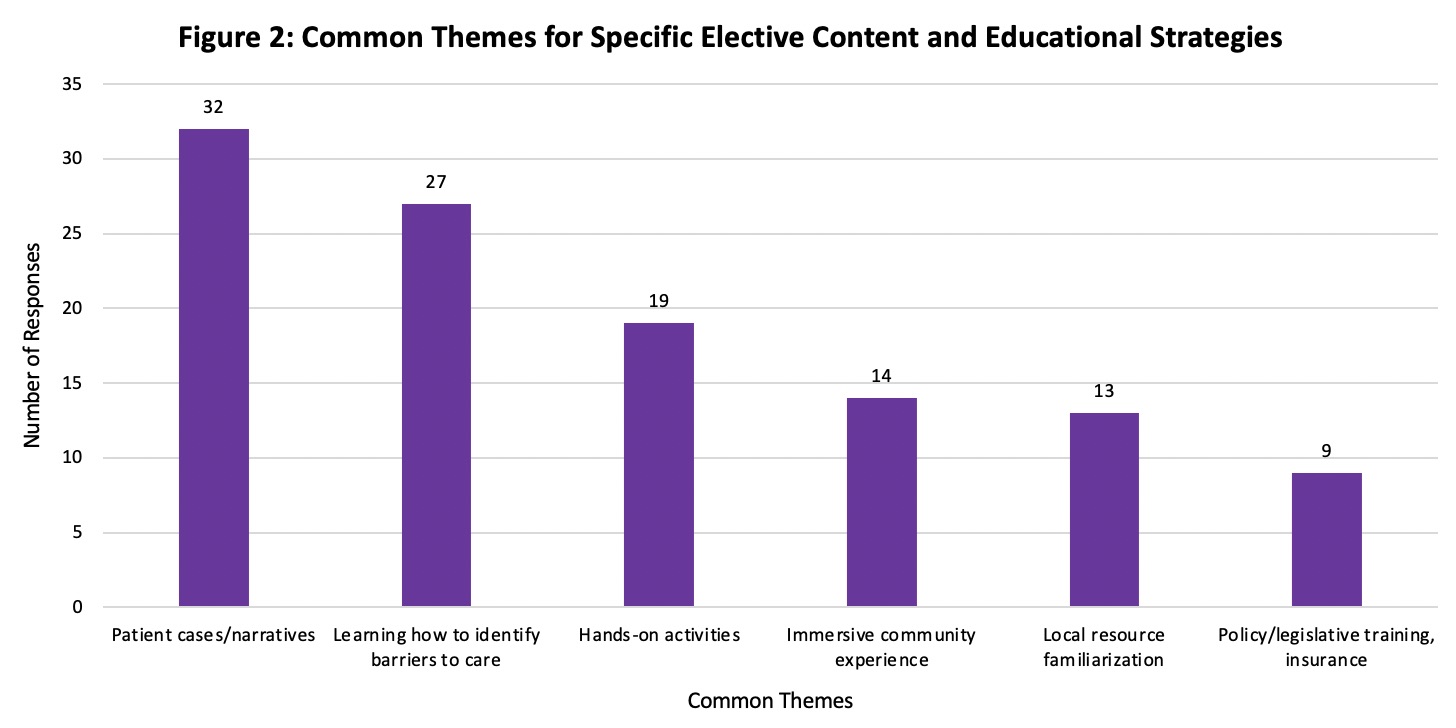Back
Medical Education: Medical Student
Category: Abstract Submission
Medical Education 1 - Medical Education: Medical Student
559 - Leaders in Immigrant Child Health: A Needs Assessment to Inform Development of an Advocacy Curriculum for Trainees
Friday, April 22, 2022
6:15 PM – 8:45 PM US MT
Poster Number: 559
Publication Number: 559.115
Publication Number: 559.115
Sarah Koshy, University of Texas Southwestern Medical School, Dallas, TX, United States; Hilda Loria, University of Texas Southwestern Medical School, Dallas, TX, United States

Sarah Koshy
Medical Student
University of Texas Southwestern Medical School
Dallas, Texas, United States
Presenting Author(s)
Background: Advocacy is an essential skill for physicians that is endorsed as a requirement by accrediting organizations; however, existing curricula on advocacy are limited, inconsistent, and focused on resident education. Advocacy education and practice at the undergraduate medical level provides a unique opportunity for students to be exposed to advocacy, the interdisciplinary nature of medicine, and early community involvement. In partnership with a local collaborative focused on advocacy for children in immigrant families, this work focused on the development of an advocacy curriculum for trainees interested in physician advocacy focused on immigrant health.
Objective: To conduct a needs assessment that informs a long-term advocacy curriculum for medical students in partnership with the Dallas Immigrant Child Health Collaborative (DICHC), an advocacy group aiming to identify barriers and improve access to pediatric subspecialty services for uninsured immigrant children in Dallas, Texas.
Design/Methods: PubMed and the AAMC MedEd Portal were used to complete a literature review examining current advocacy curricula at varying educational levels. A needs assessment survey was created with the aim of collecting learner-focused data to drive objective formation, curriculum content, and educational methods. The 15-question needs assessment survey was distributed over a 3-week time period to UT Southwestern medical students.
Results: There was a total of 84 responses, with input from all four years of training. 52% of the respondents were second year medical students. Preliminary data indicated variable understanding of advocacy and its scope despite 93% of respondents foreseeing advocacy as an important aspect of their career. 74% described their knowledge on pediatric immigrant health as very/somewhat uninformed, and 62% felt uninformed on barriers to outpatient subspecialty care faced by uninsured pediatric patients. Results of this survey facilitated creation of four objectives for a new advocacy curriculum, and common learner-derived themes provided a variety of specific educational strategies to meet these goals.Conclusion(s): Medical students regard advocacy as an important aspect of their future career but express a lack of knowledge and skillset in this area. There is interest in the development of a long-term scholarly experience/curriculum focused on physician advocacy as it relates to immigrant child health. In line with Kern’s Six Steps of Curriculum Development, next steps include identifying educational strategies and stakeholders, constructing evaluation methods, and piloting the curriculum in 2022.
Figure 1: Results of Advocacy-Focused Questions from Needs Assessment Survey.jpg)
Figure 2: Common Themes for Specific Elective Content and Educational Strategies
Objective: To conduct a needs assessment that informs a long-term advocacy curriculum for medical students in partnership with the Dallas Immigrant Child Health Collaborative (DICHC), an advocacy group aiming to identify barriers and improve access to pediatric subspecialty services for uninsured immigrant children in Dallas, Texas.
Design/Methods: PubMed and the AAMC MedEd Portal were used to complete a literature review examining current advocacy curricula at varying educational levels. A needs assessment survey was created with the aim of collecting learner-focused data to drive objective formation, curriculum content, and educational methods. The 15-question needs assessment survey was distributed over a 3-week time period to UT Southwestern medical students.
Results: There was a total of 84 responses, with input from all four years of training. 52% of the respondents were second year medical students. Preliminary data indicated variable understanding of advocacy and its scope despite 93% of respondents foreseeing advocacy as an important aspect of their career. 74% described their knowledge on pediatric immigrant health as very/somewhat uninformed, and 62% felt uninformed on barriers to outpatient subspecialty care faced by uninsured pediatric patients. Results of this survey facilitated creation of four objectives for a new advocacy curriculum, and common learner-derived themes provided a variety of specific educational strategies to meet these goals.Conclusion(s): Medical students regard advocacy as an important aspect of their future career but express a lack of knowledge and skillset in this area. There is interest in the development of a long-term scholarly experience/curriculum focused on physician advocacy as it relates to immigrant child health. In line with Kern’s Six Steps of Curriculum Development, next steps include identifying educational strategies and stakeholders, constructing evaluation methods, and piloting the curriculum in 2022.
Figure 1: Results of Advocacy-Focused Questions from Needs Assessment Survey
.jpg)
Figure 2: Common Themes for Specific Elective Content and Educational Strategies

